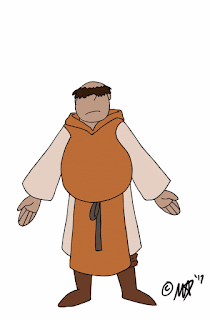Image source:
http://news.nationalgeographic.com/news/2013/03/130326-animals-medieval-manuscript-books-cats-history/
The story logline is basically a monk is trying to finish a manuscript and finds his work interrupted by a monastery cat.
Since the story is based in 15th Century Mediterranean monastery, I had to do research on mediterranian cat breeds, 15th Century fashion, 15th Century monks, manuscript writing and illumination processes and what tools were used in manuscript writing.
Mediterranean Cat Breeds:
Since the Mediterranean region borders both Africa and Europe, it has an ancient and extensive history featuring lots of migrations in both people and the animals they take with them. Due to this there are no distinct cat breeds that are endemic to the Mediterranean region.15th Century Fashion:
for the fashion, I used the information found in the Men's section on this website: http://world4.eu/italian-14th-century-clothing/, although the website was a useful resource for historical fashions, the human character was a monk, so I needed to look elsewhere.For 15th Century monk references, I found some illustrations on getty images which were more in line with the monk character
I'll provide site links since blogger hates images
Image source:
Image source:
http://www.gettyimages.co.nz/detail/news-photo/figure-of-monk-detail-from-the-miracle-of-poison-fresco-by-news-photo/154713625#figure-of-monk-detail-from-the-miracle-of-poison-fresco-by-the-second-picture-id154713625
The first 5 costume ideas were from the fashion website, and the last two (bottom right) were from the monk images
Manuscript writing and Illumination Process:
For what tools the monk is going to use, I researched the manuscript writing and illumination process. Since script writing and illumination were time-honoured traditions, and the only way to print books prior to the printing press, their processes would remain largely unchanged for centuries.Getty museum once again proved useful with their Youtube tutorials on what the manuscript writers and illuminators did throughout history (see
The
process of making ink may be of some use in the story, so I also looked at
tutorials on how to make iron gall ink from oak gall nuts:
Text reads from top to bottom:
Manuscript
writing tools
[quills
were often made from] goose flight feathers
[manuscript]
pages made from stretched leather
[quill]
shaved down to make room for hand
[manuscript]
lines would be ruled prior to writing
flat
[quill] tip produces this kind of writing
mistakes
can be scraped away
generates
'dust'
'Gall
nuts' or carbon are used to make black ink
gall
nut on oak
[gall
nut] contains tannins for ink
manuscript
would be written on an angle because of how gravity interacts with ink and
quills
top
half [of quill feather] thinner than bottom (flight feather)
Character expression sheets:
The expression sheet and rough sketches of the cat
character
text reads top to bottom:
[the cat is] just out of kittenhood
have the cat be skinny to contrast man[uscript] writer
large, expressive eyes +ears
maybe use whiskers to push expressions?
The expression sheet and rough sketches of the monk
character
text reads top to bottom:
can simplify lines
repeat this shape
stain fingers w[ith] ink?
short fingers + wide palms
large sleeves
only show eyes when really necessary?
Character turnarounds:
I cleaned up the characters and did turnarounds using
ToonBoom, at the tutor's suggestion.
The cat turnaround
The monk turnaround
The colour pallets of the characters may be subject to
change, but I'm relatively happy with their overall appearance thus far.
Next I may have to sort out backgrounds and environments






No comments:
Post a Comment